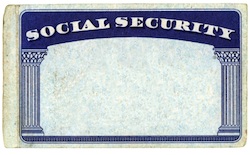By now, many of us know what a serious thing it is to protect our identities.
Identity fraud is a very real threat, and victims of identity theft find themselves fighting an uphill battle when it comes to fixing their credit, and sorting out other related problems.
However, many of us don’t think that our kids have anything to worry about. After all, they aren’t 18.
Unfortunately, there is information out there about children, too, and a growing rash of child identity theft reports could indicate that your child could be in trouble.
How Does Child Identity Theft Work?
It seems strange to think that children can be targets of ID theft when they don’t really have a public financial trail to leave. Most children have Social Security numbers, and that is what fraudsters use when setting up accounts.
Unfortunately, the computer algorithms running credit checks don’t verify ages.
An identity thief can take a child’s Social Security number, and use it to open credit accounts. Since there is no previous credit record attached to that Social Security number, it’s possible for the fraudster to create his or her own identity related to the number. The fraudster can make up a different name, and birthdate, and address, to go with the number.
It’s simpler than you might think.
And when you check for it, you might not find it. You’ll search for your child’s name and birthdate, and come up empty. You’ll think that your child’s identity is safe because no credit file has been created for him or her.
However, the Social Security number is attached to another file, and that is what you need to look for. Some thieves even go ahead and use the child’s name (with a different birthdate), feeling safe because few parents think to check the credit report of a 10-year-old.
There are cases of thieves stealing the identities of children as young as five months old. This means that you need to be aware of the problem of child identity theft.
Your child could try to get a student loan, or a credit card, and find that his or her credit is already destroyed, thanks to identity theft that you didn’t even think to check for.
You might be surprised at where your child’s information is.
Hospital records, your tax return, and even school records can be hacked or otherwise obtained, and provide identity thieves with the information they need to impersonate your child’s clean credit record — and borrow money.
Watch for Child Identity Theft Warning Signs to Protect Your Kids from Identity Theft

Be alert for the signs that your child’s identity has been stolen. The Federal Trade Commission offers some signals to watch for:
- Calls from collection agencies, or bills from credit card companies, bearing your child’s name.
- You are denied government benefits because someone else is receiving those benefits (using your child’s Social Security number).
- You receive calls from different agencies requesting confirmation of your child’s employment status — even though your child is not employed.
- You find out that the Social Security number listed on your tax return for your child is listed on another tax return (the IRS will notify you of this when you try to claim certain tax credits).
- A notice about failure to pay income taxes comes to your child.
- Credit card offers begin arriving with your child’s name.
These are indications that someone is using your child’s information to obtain credit, or to obtain a job.
If you notice these problems, you need to take action immediately. You have your child’s credit report pulled, using the appropriate Social Security number. You might need to contact the credit bureaus directly, though. You can also consider putting a credit freeze on your child’s report to prevent more accounts being opened.
Related: Get Your Credit Score and More from Credit Karma
Make sure that you are taking steps to protect your child’s personal information.
You can opt out of allowing your child’s school to share information with third parties. You should also be wary of sharing your child’s Social Security number. Verify how it will be used, and protected. You can also ask that another identifier be used; a Social Security number doesn’t need to be an identifier in many cases. At my son’s school, they have student numbers, but they are not connected to the kids’ Social Security numbers.
You need to be on top of your child’s credit.
You don’t want to be unpleasantly surprised later on down the road.